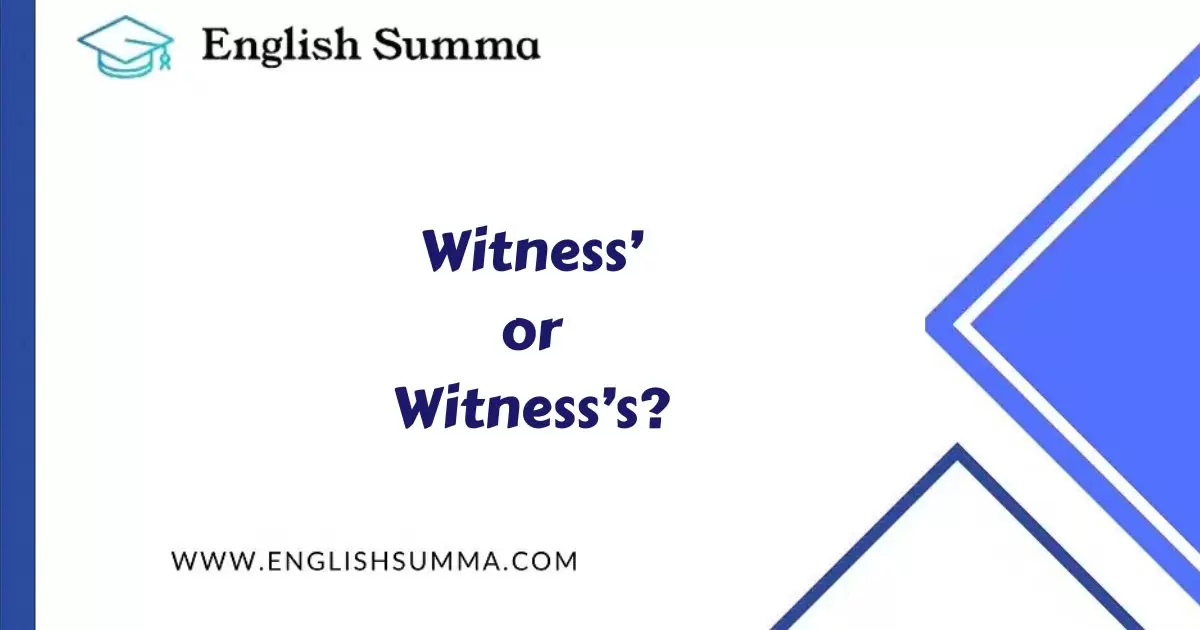Possessives in English can be tricky, especially when it comes to nouns ending in the letter ‘s’. One common dilemma arises when determining whether to use ‘s or just an apostrophe when showing possession.
This question often pops up with words like ‘witness’, leaving many unsure about the correct usage. In this article, we’ll delve into the intricacies of possessive forms in English, focusing specifically on ‘witness’ and its possessive forms. We’ll explore various scenarios and provide clear examples to illustrate the correct usage.
Understanding Possessives
Before diving into the specifics of ‘witness’ and its possessive forms, let’s review the basics of possessives in English. Possessives are used to indicate ownership or association. They typically take the form of adding an apostrophe and the letter ‘s’ (‘s) to the end of a noun, regardless of whether the noun is singular or plural.
For example:
- The dog’s bone (singular noun)
- The dogs’ bones (plural noun)
The Dilemma with ‘Witness’
When it comes to nouns ending in ‘s’, such as ‘witness’, confusion often arises regarding whether to add just an apostrophe or ‘s to indicate possession. The decision depends on whether the word is singular or plural and the pronunciation of the possessive form.
Singular Possessive: Witness’s
When ‘witness’ is singular and possesses something, you add an apostrophe and an ‘s’ (‘s) to indicate possession. This form is used for clarity in pronunciation, especially when the word ends in an ‘s’ sound.
Example 1: The witness’s testimony was crucial in solving the case.
Example 2: The boss’s office is on the top floor of the building.
Plural Possessive: Witnesses’
When ‘witness’ is plural and possesses something, you only add an apostrophe after the ‘s’ to indicate possession. This form is used to avoid redundancy in pronunciation, as the plural noun already ends in an ‘s’ sound.
Example 1: The witnesses’ statements corroborated each other’s accounts.
Example 2: The students’ notebooks were filled with colorful illustrations.
Don’t miss read out this : Thomas’ or Thomas’s?
Possessives in Context
Let’s explore different scenarios to understand the usage of possessive forms with ‘witness’ in context.
Singular Possessive
In a courtroom drama, a single witness provides crucial testimony. Here’s how we would correctly use the singular possessive form:
Example: The witness’s account of the events left the jury in awe.
Plural Possessive
Now, let’s consider a situation where multiple witnesses contribute to a case:
Example: The witnesses’ testimonies painted a clear picture of what transpired.
Possessive with Joint Ownership
In a collaborative effort, two or more witnesses jointly possess something. Here’s how we indicate joint ownership:
Example: The witnesses’ collaborative effort resulted in a comprehensive report.
Common Mistakes to Avoid
While understanding possessive forms with ‘witness’ is crucial, it’s also essential to avoid common mistakes. Let’s highlight a few:
- Incorrect: The witnesses’s accounts conflicted with each other.
Correct: The witnesses’ accounts conflicted with each other. - Incorrect: The witness’s provided valuable insights into the case.
Correct: The witness’ testimony provided valuable insights into the case.
By paying attention to these nuances, you can ensure clear and accurate communication in your writing.
Conclusion
Navigating possessive forms in English, particularly with words ending in ‘s’, requires attention to detail. When it comes to ‘witness’, remember to use ‘witness’s’ for singular possession and ‘witnesses’’ for plural possession. Understanding these distinctions will enhance clarity and precision in your writing. So, the next time you’re unsure about whether to use ‘s or just an apostrophe with ‘witness’, refer back to this guide for guidance.
In conclusion, mastering possessive forms in English empowers you to convey ownership and association effectively. By grasping the nuances of ‘witness’ and its possessive forms, you can elevate the clarity and accuracy of your writing. So, the next time you encounter the dilemma of ‘witness’ or ‘witness’s’, you’ll be well-equipped to make the right choice.
Remember, clarity in communication is key, and understanding possessive forms is a vital aspect of achieving it. With practice and attention to detail, you can confidently navigate possessives in English writing.

Meet Steven Smith, the driving force behind “English Summa.” Armed with a Bachelor’s Degree in Linguistics and a passion for teaching, Steven is dedicated to unraveling language intricacies for eager minds. Join him on a journey of linguistic discovery through Language Odyssey—a space where education meets inspiration, and the beauty of language unfolds.

